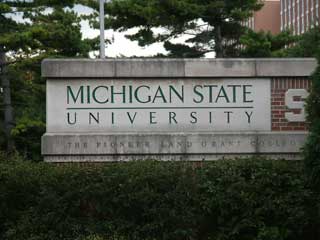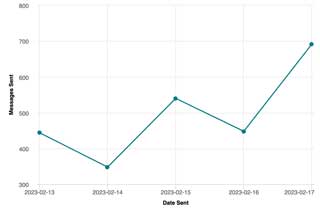Lansing Update: Gun Safety Measures Top of Legislature’s Mind After MSU and more…
Posted February 17, 2023
In this update:
- Gun Safety Legislation Moves to Top of Agenda After Tragedy at Michigan State
- Advocates Set Record with 2,000+ Messages Sent to Lawmakers to Protect Religious Freedom
- Senate Approves Bill with Increased Tax Relief Benefit for Working Poor
Gun Safety Legislation Moves to Top of Agenda After Tragedy at Michigan State
The horrific tragedy at Michigan State University this past week has moved gun safety legislative proposals to the top of the Michigan Legislature’s agenda.
Earlier this year, Gov. Gretchen Whitmer in her State of the State address called for expanding background checks on gun purchases in Michigan, safe gun storage laws, and extreme protection order legislation, also known as “red flag” laws.
The Democratic majority in the Legislature have also vowed to act on gun reforms as part of their legislative agenda in controlling both the House and Senate for the first time in decades.

After a gunman killed three MSU students and seriously injured five others on campus late Monday evening, Michigan lawmakers cancelled legislative session for most of the week.
But on Thursday, 11 bills were introduced in the Michigan Senate to implement those gun safety-related policies that Gov. Whitmer called for earlier this year and that many Democratic lawmakers have wanted to enact.
For background checks, Senate Bills 76–78 would expand Michigan’s background check law to include all firearms, not just pistols. They would also adjust the Michigan Penal Code and sentencing guidelines for violations.
On safe storage, Senate Bills 79–82 would require the safe storage of firearms that could be accessible by minors, create sentencing guidelines for violations, exempt storage devices and gun locks from sales/use taxes, and require signage at the point of sale regarding the tax exemption.
And for the red flag legislation, Senate Bills 83–86 would establish procedures for Extreme Protection Orders (EPO), which would allow the temporary confiscation of firearms from individuals deemed by a court process to be a danger to themselves or others. The bills would prohibit an individual under an EPO from purchasing firearms and establish sentencing guidelines for violations of an EPO or making false statements when petitioning the court for an EPO.
Michigan Catholic Conference (MCC) has previously supported and spoken out in support of safe storage legislation. MCC is also supportive of legislation to expand background checks and establish EPO procedures — which aligns with advocacy the U.S. Conference of Catholic Bishops has engaged in at the federal level — in recognition these measures are a step toward addressing a culture of violence that diminishes human life.

At the same time, MCC recognizes no single policy can address an issue as complex as gun violence. MCC highlighted previously a letter the U.S. bishops sent to Congress last summer, which listed off other issues to address like “mental health, the state of families, the valuation of life, the influence of entertainment and gaming industries, [and] bullying,” in addition to the availability of firearms.
Also introduced this week was a separate 13-bill package in the House intended to improve school safety measures, which originate from a bipartisan task force. Among the proposals in the wide-ranging package include the creation of a school safety office within the Michigan State Police and safety training for school staff as well as student mental health support.
The bills (House Bills 4088–4100) are a reintroduction of legislation from last session, which MCC supported.
Advocates Set Record with 2,000+ Messages Sent to Lawmakers to Protect Religious Freedom
The grassroots effort by advocates like you to urge Michigan lawmakers to include religious protections in pending civil rights legislation has set a record for engagement among campaigns MCC has initiated.
This past Monday, Feb. 13, MCC issued an action alert calling on members of the Catholic Advocacy Network (CAN) to message lawmakers to protect religious institutions’ freedom to serve as they consider changes to the Elliott-Larsen Civil Rights Law (ELCRA).
Since then, more than 2,000 messages have been sent to members of the House and Senate, shattering records of messages sent to lawmakers in previous action alerts MCC has issued, and the numbers continue to grow.

As of the afternoon of Friday, Feb. 17, more than 2,400 messages have been sent, making this the campaign with the most participation from grassroots ever initiated by MCC, based on messages sent to lawmakers.
As of Friday afternoon (Feb. 17), more 1,100 advocates have contacted their representatives, including more than 800 new advocates who have not participated in previous MCC action alerts.
This week, the Michigan Association of Nonpublic Schools (MANS) has joined MCC in these advocacy efforts and directed its members to MCC’s action alert as well. Also joining MCC in the growing coalition advocating for religious protections is the Council on American-Islamic Relations (CAIR), which is working to mobilize their members. The MCC action alert was issued after a Senate committee last week moved Senate Bill 4 without including religious protections in a bill to amend the ELCRA to include sexual orientation and gender identity as protected from discrimination.
The MCC action alert was issued after a Senate committee last week moved Senate Bill 4 without including religious protections in a bill to amend the ELCRA to include sexual orientation and gender identity as protected from discrimination.
MCC and other allies have urged lawmakers to include religious protections in the bill so that faith-based institutions are not discriminated against based on their beliefs in one-man, one-woman marriage or in the biological differences of males and females.
MCC’s advocacy work on Senate Bill 4 and on a similar ELCRA expansion bill in the House will continue, as the full Senate could vote on Senate Bill 4 next week.
If you have not already, we urge you to contact your lawmaker on this issue by sending them a pre-written message.
If you have contacted your lawmakers, thank you for adding your voice to the more than 1,000 advocates (and growing) who are speaking up for First Amendment rights and religious organizations’ freedom to serve.
Senate Approves Bill with Increased Tax Relief Benefit for Working Poor
The Senate this week joined the House in approving a bill to increase the state Earned Income Tax Credit (EITC) to 30%, which would dramatically increase the benefit working low-income families would receive from the credit.
The Michigan Senate voted to approve House Bill 4001 this week, which includes the bipartisan-supported increase to the EITC along with other tax relief related measures.
“Michigan’s hardworking families, dealing with ever-rising costs, will finally get the economic relief they deserve,” said Tom Hickson, vice president of public policy at MCC, in a statement issued after the Senate approved the bill. “Expansion of the EITC is a pro-family, pro-children policy that provides a level of stability and assistance to help less affluent families get by and cover the cost of basic necessities that many families struggle to afford.”
A crucial vote to grant the bill immediate effect, which would ensure families receive the expanded EITC benefit as soon as this year when they file their 2022 taxes, is still pending before the bill is sent to the Governor.
However, at this point, both chambers have signed off on increasing the state EITC to 30%, meaning the policy to expand the benefit is just a signature away from the Governor from becoming law, the culmination of two years of advocacy by MCC and other supporting organizations to expand this tax relief for the working poor of Michigan.
